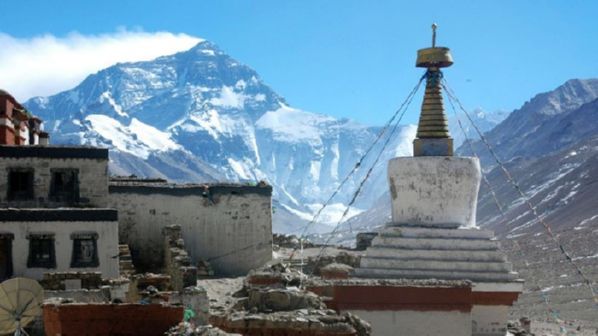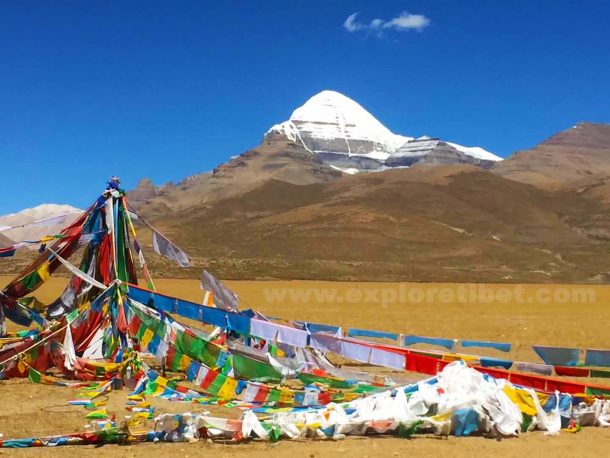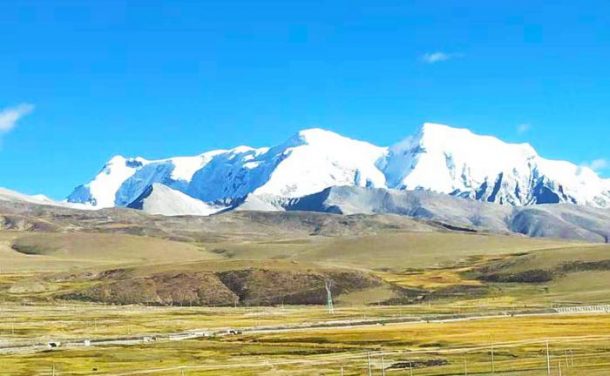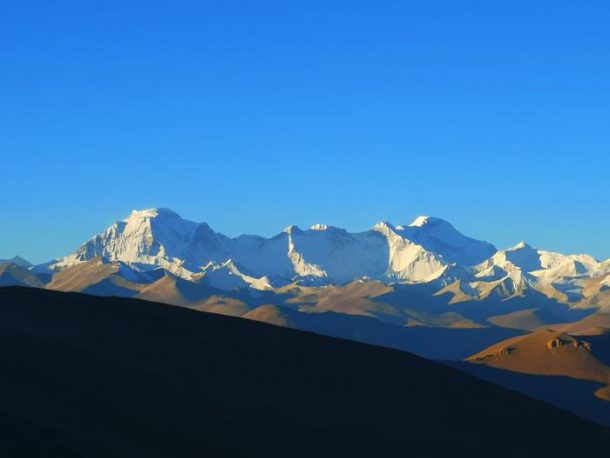
The Most Famous Mountains of Tibet
Tibet is a land of lakes and rivers, forests and valleys, and a vast number of huge mountains. It is ringed by the world’s highest mountain ranges and stretching for more than 2,400 kilometers from Pakistan to China. The Himalayas are the highest mountains in the world, Mount Everest is the highest among all. Tibet is containing more than 30 of the world’s highest mountains. This famous mountains of Tibet run along Tibet’s western and southern borders and protect the plateau from the harsh Indian monsoon.
There are so many mountains that are well known, even world famous. These mountains are among the most popular places to visit for touring international travelers. The most famous mountains of Tibet are from the massive heights of Mount Everest and the sacred slopes of Mount Kailash to the holy mountain of Nyenchen Tanglha. Wherever you head in Tibet, you can find holy or sacred mountains, and four of the world’s 14 highest mountains lie in the region. These are the most visited places during Tibet travel.
Table of Contents
Mount Everest
Mount Everest is one of the most famous mountains of Tibet as well as in the world. It rises 8,848 meters (29,029 ft) above sea level and is considered to be the peak of mountaineering across the world. Lying right on the border of Nepal and Tibet(China), the borderline crossing over the summit, this vast mountain was unconquered for almost 100 years after its discovery. It has claimed the lives of thousands of climbers during expeditions.

The view of Everest from Rongbuk Monastery
Known in Nepali as Sagarmatha and in Tibetan as Chomolungma. By climbing the mountain is considered to be a feat in the eyes of the climbing community. And many experienced climbers attempt to scale its slopes every year. Following in the footsteps of Tensing Norgay and Sir Edmund Hillary, the first people to reach the summit.
Like many mountains in Tibet, Mount Everest has its holy connotations in Tibetan Buddhism. Not only is the summit of the mountain believed to be the home and playground of Miyolangsangma. A Tibetan Buddhist “Goddess of Inexhaustible Giving”, where climbers are partially welcome as uninvited guests. But the Sherpa people believe that the slopes of the mountain are blessed with spiritual energy. Whereas the karmic effects of a person’s actions have magnified a thousand-fold, and where impure thoughts should be avoided.
Mount Kailash
It is known as the most sacred mountain in the world. Mount Kailash is revered in four separate religions and is one of the few mountains in the world over 6,000 meters that has never been climbed. For Hindus, Buddhists, Jains, and the Bonpo, the mountain is either the center of the universe or the earthly abode of a great god, such as Lord Shiva. Therefore it is one of the most famous mountains of Tibet. It is located in the west of Tibet, in Ngari Prefecture, this vast pyramid-shaped mountain is another popular tourist location, as well as the most popular pilgrimage destination in Tibet.

Mount Kailash in Tibet
It renowned for its sacred status, the mountain is surrounded by myths and legends, and in Tibetan Buddhism. It is the site where the Buddhist sage, Milarepa, defeated the champion of the Bon religion, Naro Bon-Chung. For dominance over the people of the region. Known as Kailāsa in Sanskrit, Gang Rinpoche in Tibetan, and the Nine Stacked Swastika Mountain by the Bonpo. Mount Kailash is the site of one of the greatest pilgrimage koras and treks in the world.
As a sacred mountain, the slopes of Mount Kailash have never felt the tread of mankind, and likely never will. While attempts have been made to start an expedition to the summit. But none has ever succeeded, with the earliest surveys and climbing expeditions put off by sudden and unusual storms around the area of the mountain. The last expedition planned to scale this sacred peak in 2001 received international backlash for their expedition plans. The Chinese government denied them the chance to make the climb, stating that the sacred mountain was prohibited from being scaled.
Nyenchen Tanglha
Lying in the western part of the Nyenchen Tanglha Range, Mount Nyenchen Tanglha is the highest peak in the range, at an elevation of 7.162 meters. Part of the vast range known as the Transhimalaya, which includes the Gangdise Mountains, and stretches across the middle of the Tibetan plateau, the range lies on the watershed between the Changtang Plains to the north and the Yarlung Tsangpo River to the south. Located in the Lhasa prefecture-level city, this stunningly beautiful mountain is the highest mountain close to the Tibetan capital.

Nyenchen Tangla Mountain Range in Tibet
It was formed by three summits, all above 7,000 meters. Nyenchen Tanglha is the highest mountain in the Transhimalaya. Its highest summit was the first to be climbed, in 1986, followed by the other two in 1989 and 1995 respectively. The mountain is also a sacred mountain in Tibet, and in Tibetan mythology. It is believed to be the most influential deity in most of northern Tibet. Considered as being a bodhisattva of the eighth level in Tibetan Buddhism. Nyenchen Tanglha is depicted in his mortal form wearing a robe of satin and carrying a whip and Buddhist rosary in his hands, riding a pristine white stallion. The protector of the Nyingma Tradition of Tibetan Buddhism. He has been the subject of countless fairy tales and legends in Tibetan folklore.
Mount Cho Oyu
The Mount Cho Oyu is the sixth highest mountains in the world. Mount Cho Oyu is lying on the border between Tibet and Nepal and stands at a height of 8,188 meters above sea level. In Tibetan, Cho Oyu means “Turquoise Goddess”, and the mountain is believed to be the sacred home of one of the major deities of Tibetan Buddhism. It is located in the westernmost end of the Khumbu Region of Nepal and the most southwestern end of Shigatse Prefecture in Tibet. Mount Cho Oyu is just 20 kilometers from Mount Everest and provides some great views of the world’s highest mountain.

Mount Cho Oyu, One of the most famous mountains of Tibet
Just a few kilometers west of the peak lies the Nangpa La Pass. It is the main trade route between Tibetans and Khumbu Sherpas. The route for Sherpa pilgrims making the trek to Rongbuk Monastery in Tibet for their annual pilgrimage.
Namche Barwa
As the easternmost peak over 7,000 meters in the entire Himalayas. Namche Barwa is the traditional eastern anchor of the Himalayas. It is lying in an isolated area of Tibet rarely visited by tourists to the region. Namche Barwa lies inside the Great Bend of the Yarlung Tsangpo River, at the point where the river enters its famous gorge. It is the biggest river gorge in the world. Its sister peak, Gyala Peri, rises 7,294 meters above sea level across the span of the river valley, 22 kilometers away, marking the other side of the entrance to the gorge.
It is standing at 7,782 meters high. Namche Barwa was first discovered by western surveyors in 1912. But it was not until the 1980s that attempts were made to scale its slopes. After several dozens failed attempts throughout the ‘80s and ‘90s. The mountain was finally scaled by a joint Chinese and Japanese expedition, which reached the summit of the mountain on October 30, 1992. Since then, no other expedition has been recorded to have scaled this isolated peak.
Tibetan legend has it that a prophecy exists around the mountain among the Kongbo Tibetans that live in the area. The prophecy states that one day, Namche Barwa will fall into the Yarlung Tsangpo River Gorge. And completely blocking the flow of the river. The river will then turn aside from the dam, and flow over the Doshong La Pass and into Bome County of Nyingchi Prefecture.
These are the most famous mountains of Tibet and as well as the most sacred mountains of Tibet. Every year thousands of Tibetans, Chineses, and foreign tourists visit Tibet to witness these amazing landscape of Tibet. Tibet owned travel companies offers amazing Tibet tours for visitors around the world. The famous mountains of Tibet are the highlight of Tibet tours.
Recent Posts
Discover Tibet in 2024
Traveling to Tibet Alone
A Photography Tour in Tibet
All Categories
- About Tibet
- book a Tibet tour
- Buddhism Practice
- Budget Tour
- China-Tibet Train
- Customized Tibet tour
- Historical Sites
- Hot Springs in Tibet
- News
- Photography in Tibet
- Tibet attraction
- Tibet Group Visa
- Tibet Motorcycle Tour
- Tibet Small Group Tours
- Tibet Tours and Tibetan Tour Guide
- Tibet Train
- Tibet Travel FAQs
- Tibet Travel Information
- Tibet Travel News
- Tibet Travel Permit Update
- Tibet Travel Prices Rises
- Tibet Trek
- Tibet Trekking Tour
- Tibet weather and climate
- Tibet Wildlife animals
- Tibet Winter Tour
- Tibetan Buddhism
- Tibetan Cultural Features
- Tibetan Culture and Poeple
- Tibetan Festivals
- What to see in Tibet



